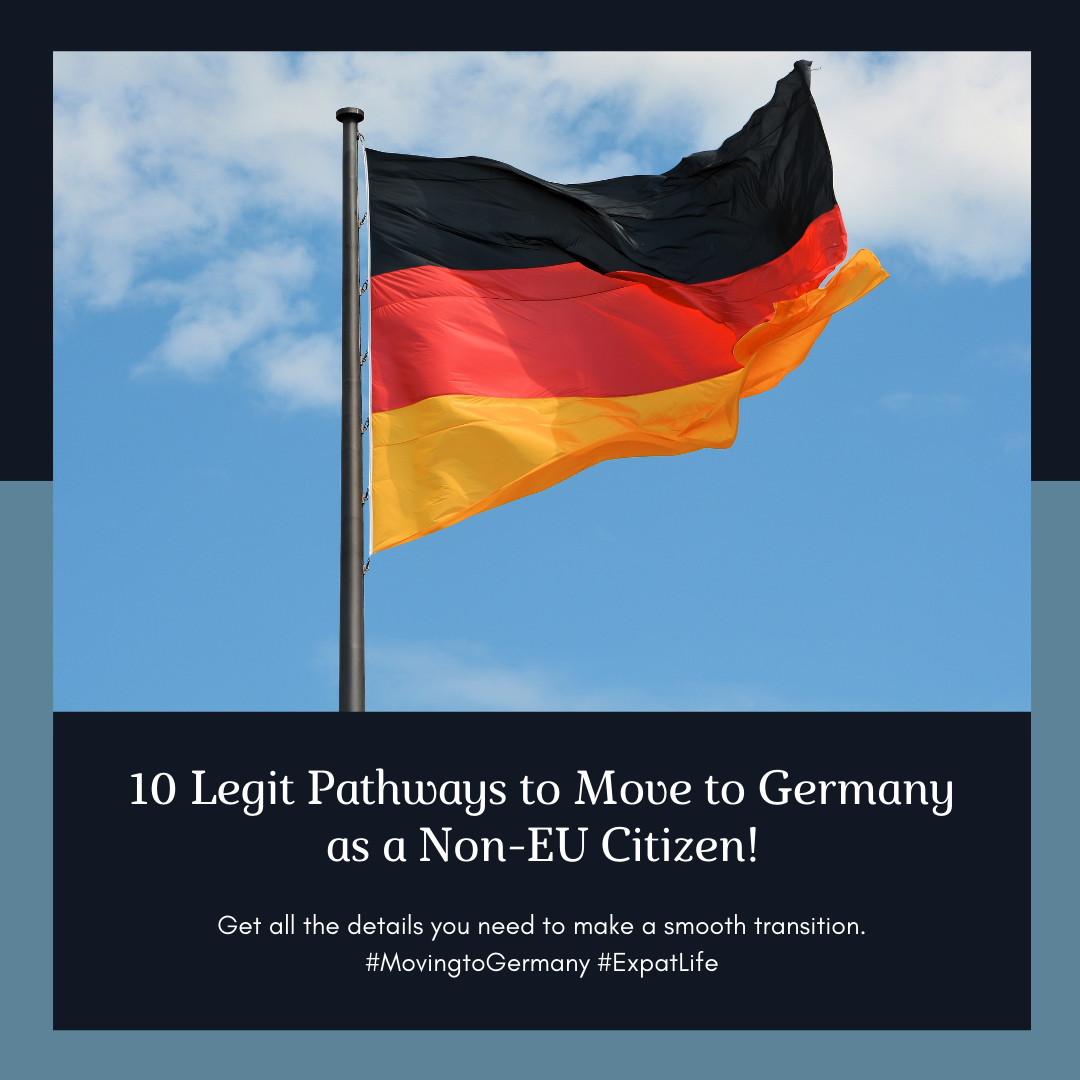Introduction
Moving to Germany is a dream for many individuals seeking new opportunities, a vibrant culture, and a high quality of life. While the process may seem daunting, there are legal pathways available for Africans looking to make Germany their new home. In this comprehensive guide, we’ll delve deeper into each of the 10 diverse and legitimate ways to move to Germany, covering eligibility requirements, real-life examples, and actionable steps for each pathway.
What's Covered in This Article
Germany Au Pair Program: Cultural Exchange with a Purpose
The Au Pair program offers a unique opportunity for young individuals to immerse themselves in German culture while providing childcare assistance to a host family. Eligibility requirements typically include being between 18 and 26 years old, having childcare experience, and possessing basic German language skills.
Eligibility Requirements:
- Age between 18 and 26.
- Childcare experience.
- Basic proficiency in the German language.
Example: Sarah, a 23-year-old from Nigeria, dreams of experiencing German culture. To qualify for the Au Pair program, she needs to showcase her childcare experience, enroll in a basic German language course, and secure a host family.
Action Points: a. Enroll in a language course to meet basic German language requirements. b. Compile a comprehensive childcare portfolio.
-
Educational Pathway: Building a Future Through Study
Germany is renowned for its world-class education system. Pursuing academic opportunities through scholarships, short courses, or full-degree programs is a viable pathway. Eligibility varies depending on the chosen program, but generally, a high school diploma or equivalent is required.
Example: Ahmed, a 20-year-old student from Ghana, secures a scholarship for a master’s program in engineering at a German university.
Action Points: a. Research scholarship opportunities through DAAD (German Academic Exchange Service). b. Contact universities directly to inquire about admission requirements.
-
Job Seeker Visa: Navigating the German Job Market
The Germany Job Seeker Visa is designed for skilled professionals seeking employment in the country. Eligibility criteria include having a recognized qualification, sufficient funds, and relevant work experience.
What are the requirements to receive a Germany visa for jobseekers?
- You are able to provide proof of vocational or academic training.
- Your qualifications are recognized in Germany or are equivalent to a German degree or diploma. If you are seeking employment in a regulated profession, i.e. in healthcare, a professional practice permit is mandatory.
- Have you completed vocational training? If so, you must provide proof of possessing the German language skills required for the job you are seeking. Generally speaking, a minimum level of B1 in accordance with the Common European Framework of Reference for Languages (CEFR) is required.
- You are able to prove that you can cover your costs of living, since you are not able to enter into remunerated employment during this time. Proof of being able to cover living costs can be provided in the form of a blocked bank account or a Declaration of Commitment.
Example: Aisha, a software developer from Kenya, applies for a Germany Job Seeker Visa to explore opportunities in the tech industry.
Action Points: a. Get academic and professional qualifications recognized by relevant German authorities. b. Prepare a comprehensive CV tailored to the German job market.
-
Voluntary Work
Volunteering is an excellent way to contribute to society while gaining valuable experience. Organizations like Freude Waldorf offer opportunities for volunteers to engage in meaningful projects. Eligibility requirements often include a genuine interest in the cause and a commitment to volunteering.
Eligibility Requirements:
- Genuine interest in the organization’s cause.
- Commitment to volunteering.
Example: James, a 25-year-old from South Africa, volunteers with Freude Waldorf to support educational initiatives in Germany.
Action Points: a. Research organizations that align with personal interests and values. b. Reach out to the chosen organization to inquire about volunteer opportunities.
-
Nursing Apprenticeship (Ausbildung): Caring for the Future
Germany faces a shortage of healthcare professionals, making it an attractive destination for aspiring nurses. Eligibility for nursing apprenticeships typically includes a secondary school diploma and proficiency in the German language.
Eligibility Requirements:
- Secondary school diploma or equivalent.
- Proficiency in the German language.
Example: Fatima, a nurse from Nigeria, pursues a nursing apprenticeship in Germany to enhance her skills and contribute to patient care.
Action Points: a. Enroll in German language courses to meet language proficiency requirements. b. Research and apply for nursing apprenticeship programs through recognized institutions.
-
Marriage: Tying the Knot for Residency
For those in a relationship with a German citizen or resident, marriage is a direct pathway to obtaining a residence permit. The process involves providing evidence of a genuine relationship and meeting specific legal requirements.
Have your wedding in Denmark or Belgium.
These are the easiest European countries to get married in and have your wedding in with a foreigner.
Eligibility Requirements:
- Genuine relationship with a German citizen or resident.
- Meeting specific legal requirements for marriage.
Example: David, from Ethiopia, marries his long-time German partner, allowing him to apply for a residence permit based on family reunification.
Action Points: a. Gather necessary documents, such as proof of relationship and marriage certificates. b. Schedule an appointment with the local immigration office to initiate the process.
-
Asylum Seeker: Seeking Refuge and Protection
This should be your last resort.
In cases of persecution or fear of serious harm, individuals may seek asylum in Germany. Eligibility is determined based on international and national laws, with applicants needing to provide evidence of their need for protection.
Eligibility Requirements:
- Evidence of persecution or fear of serious harm.
- Compliance with international and national laws.
Example: Mariam, a political activist from Eritrea, seeks asylum in Germany due to threats to her safety in her home country.
Action Points: a. Familiarize yourself with the asylum application process and legal requirements. b. Consult with legal experts or organizations specializing in asylum cases for guidance.
-
Entrepreneurial Residency: Building a Business and a Life
Germany encourages entrepreneurship, and there are pathways for individuals looking to start and run their own businesses. Eligibility criteria often include a solid business plan, relevant experience, and adequate financial resources.
Eligibility Requirements:
- Solid business plan.
- Relevant entrepreneurial experience.
- Adequate financial resources.
How to Secure a German Freelance Visa – “Freiberufler”
– A Guide to Self-Employment in Germany
The freelance visa serves as a residence permit tailored for those engaging in self-employment within Germany. With this visa, you gain the privilege to:
- Reside in Germany
- Establish and operate a business or work as a freelancer
- Bring your family to Germany
- Travel to other Schengen countries without requiring an additional visa
- Potentially become a permanent resident after 3 to 5 years
Both the artist visa and the language teacher visa fall under the umbrella of the freelance visa, and the application process remains identical. It’s crucial to note that while this guide focuses on the application process in Berlin, procedures may differ in other German cities.
Who Requires a Germany Freelance Visa?
The Germany freelance visa acts as a specific type of residence permit necessary for individuals not holding citizenship or permanent residency in the EU, EEA, or Switzerland.
Your existing residence permit may permit self-employment. Look for indications such as:
- “Erwerbstätigkeit erlaubt” (all occupations allowed, including self-employment)
- “Selbständige Tätigkeit gestattet” (self-employment is allowed)
Should your work visa or Blue Card grant permission for self-employment, part-time freelancing is possible. However, to engage in full-time freelance work, a dedicated freelance visa is required.
Freelance Visa Requirements
Securing a freelance visa necessitates meeting the following criteria:
- Local Economic Interest:
- Maintain clients in Germany or contribute to the German economy, a crucial aspect for visa approval.
- Sufficient Income:
- Generate income exceeding living expenses, including rent, health insurance, and a minimum monthly amount (varies by city).
- Self-Employed Status:
- Solely operate as a self-employed individual; traditional employment with social benefits is not permissible.
- Job-Specific Permits:
- Possess all required permits and qualifications for the chosen profession. Specialized professions like doctors, engineers, and lawyers have additional requirements.
- Age and Financial Requirements (if over 45):
- Private retirement pension guaranteeing €1,432.59 per month for at least 12 years at age 67.
- Alternatively, entitlement to a public pension in specific countries, or business assets amounting to €206,293.
Language proficiency is not mandatory for obtaining a freelance visa, and a degree is only necessary if the chosen profession explicitly demands one (e.g., law).
It is essential to review the specific requirements for your profession before embarking on the freelance visa application process. This guide provides valuable insights for those seeking to navigate the complexities of securing a freelance visa in Germany.
Example: Kwame, an entrepreneur from Ghana, establishes a tech startup in Germany, qualifying for residency through the Entrepreneurial Residency program.
Action Points: a. Develop a comprehensive business plan. b. Seek guidance from local business development agencies in Germany.
-
EU Blue Card: Skilled Professionals in High Demand
The Blue Card is designed for non-EU skilled professionals to work and live in Germany. Eligibility criteria include a recognized qualification, a binding job offer, and a minimum salary threshold.
Example: Patricia, an IT specialist from Nigeria, secures a job in Germany with a tech company, qualifying for the Blue Card.
What are the EU Blue Card requirements?
- You have a German degree or a foreign degree that is comparable to a German degree. If you do not have a traditional university degree, you must demonstrate that you have a tertiary-level qualification that took at least three years to complete in order to obtain an EU Blue Card. In Germany, this qualification must correspond to at least level 6 of the International Standard Classification of Education (ISCED 2011) or level 6 of the European Qualifications Framework. Examples of such training qualifications include “Master craftsman training / Master craftswoman training” as well as professional qualifications in educator professions.
- You already have a specific job offer from a company in Germany. The job offer must meet the following conditions:
- The period of employment must be at least six months.
- The job must match your qualification (degree).
- Your job in Germany must enable you to earn a gross annual salary of at least €43,800 (as of 2023).
- If you are employed in a profession with shortage of skilled workers in Germany, you can also obtain an EU Blue Card with a lower gross annual salary of at least €39,682.80 (as of 2023) if the Federal Employment Agency (BA) has approved your employment. The salary thresholds are published annually by the Federal Ministry of the Interior and Community. The following occupations are considered to be bottleneck professions in Germany:
- Manufacturing, mining, construction and distribution managers
- Information and communications technology service managers
- Professional services managers, such as childcare services, health services and education managers
- Academic STEM professionals
- Academic professionals in architecture, spatial planning and transport planning
- Medical doctors
- Veterinarians
- Dentists
- Pharmacists
- Academic and comparable nursing and midwifery professionals
- School and out-of-school teachers and educators
The detailed list of bottleneck professions for the EU Blue Card can be found here.
If you would like to work in Germany as an IT professional or manager without a formal qualification? Under certain conditions, you may be able to obtain an EU Blue Card under Section 18g of the Residence Act [AufenthG]..
- You must be able to demonstrate that you have a specific job offer as an IT professional in Germany. The period of employment must be at least six months.
- Your job in Germany must enable you to earn a gross annual salary of at least €39,682.80 (as of 2023).
- You must have worked in IT for at least three of the past seven years. Your professional experience must have been at university level and a prerequisite for employment in Germany.
Action Points: a. Research job opportunities in Germany in the desired field. b. Ensure qualifications meet the recognized standards in Germany.
-
Family Reunion for Refugees: Reuniting with Loved Ones
For individuals who have been granted refugee status, Germany allows for family reunion. Eligibility criteria include having a recognized refugee status and the ability to support family members.
Eligibility Requirements:
- Recognized refugee status.
- Ability to support family members.
Example: Jamal, a refugee from Somalia, successfully reunites with his family in Germany after being granted refugee status.
Action Points: a. Obtain official recognition as a refugee in Germany. b. Submit a family reunion application through the proper channels.
Conclusion
Germany’s commitment to diversity and openness makes it an attractive destination for individuals seeking new opportunities and experiences. By understanding and navigating these 10 legal pathways, Africans can pave the way for a successful and fulfilling life in Germany. Whether through cultural exchange programs, educational pursuits, career opportunities, humanitarian efforts, or entrepreneurial ventures, the doors to a brighter future are wide open for those willing to take the first step. The rich tapestry of German life awaits those who embark on this exciting journey, offering not just a change of location but a transformational experience that lasts a lifetime.


